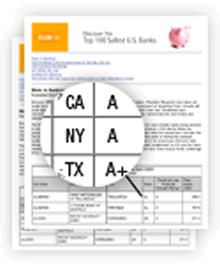How Safe Are America's Biggest Banks?
Companies / Credit Crisis 2011 Dec 06, 2011 - 04:34 PM GMTBy: EWI
 Lost in the clamor over the central banks' "let there be liquidity" pronouncement, Standard & Poor's just downgraded fifteen major U.S. and European banks.
Lost in the clamor over the central banks' "let there be liquidity" pronouncement, Standard & Poor's just downgraded fifteen major U.S. and European banks.
The downgrade doesn't mean Bank of America, Goldman Sachs, Citigroup, Barclays, UBS, Wells Fargo and others will close shop tomorrow. But the long-term credit downgrade does raise questions about their stability.
After all, the 2007-2009 financial crisis has supposedly passed. But during the two-year "recovery," did most big banks really return to sound fiscal health? Well, Standard & Poor's downgrade speaks for itself.
One reason for the downgrades was Standard & Poor's own revision to its rating system. Nonetheless, CNBC reported (11/29), "The outcome of the re-rating of the biggest banks was worse than S&P has forecast for all banks."
And apparently, the big banks were in worse shape in 2008 than most people realized. Thanks to the Freedom of Information Act, Bloomberg just revealed that banks got more bailout money from the Federal Reserve than was previously made public:
"The Fed didn't tell anyone which banks were in trouble so deep they required a combined $1.2 trillion on Dec. 5, 2008, their single neediest day. Bankers didn't mention that they took tens of billions of dollars in emergency loans at the same time they were assuring investors their firms were healthy." -- Bloomberg, November 28
And in light of the downgrades, what does this revelation say about assurances of financial stability that come from the banks today?
Please consider this insightful excerpt from the September Elliott Wave Theorist:
"The Coming Worldwide Bank run" "In the late 1990s and mid 2000s, the loan-to-deposit ratio for U.S. banks was nearly 1.00, meaning that almost all deposits were lent out. That shortfall alone was a serious problem, because if even 5% of depositors had decided to withdraw their money, banks would have been unable to pay. Some of the banks' loans were quickly callable, but by 2006, the credit-fueled real estate boom had claimed a large percentage of outstanding loans, both inside and outside the banking system.
These loans are not quickly callable. The problem was serious in 2002 and enormous in 2006. Now it has become acute, because many loans are becoming fossilized, as the market for mortgage investing has dried up while foreclosures on the 'collateral' have been slowed by court actions and politics. "The specter of a banking panic has become far darker since the collateral for bank deposits -- land and buildings -- has fallen globally in value at the steepest rate since the Great Depression. One day this shortfall in collateral value will impress itself on people's minds, and there will be an unprecedented run on banks around the globe.... Yes, I know about the FDIC, but I don't believe it will be able to fulfill its promises when most banks go bust."
Notice the phrase in the last sentence of the quote, "most banks" This obviously implies that some banks are safer than others.
What is the best course of action to safeguard your money? Read our Free 10-page Report titled "Discover the Top 100 Safest U.S. Banks" to learn:
|
This article was syndicated by Elliott Wave International and was originally published under the headline America's Biggest Banks: How Safe Are They?. EWI is the world's largest market forecasting firm. Its staff of full-time analysts led by Chartered Market Technician Robert Prechter provides 24-hour-a-day market analysis to institutional and private investors around the world.
About the Publisher, Elliott Wave International Founded in 1979 by Robert R. Prechter Jr., Elliott Wave International (EWI) is the world's largest market forecasting firm. Its staff of full-time analysts provides 24-hour-a-day market analysis to institutional and private around the world.
© 2005-2022 http://www.MarketOracle.co.uk - The Market Oracle is a FREE Daily Financial Markets Analysis & Forecasting online publication.




